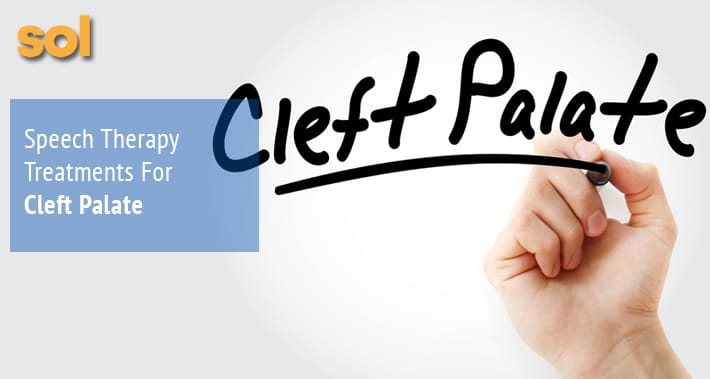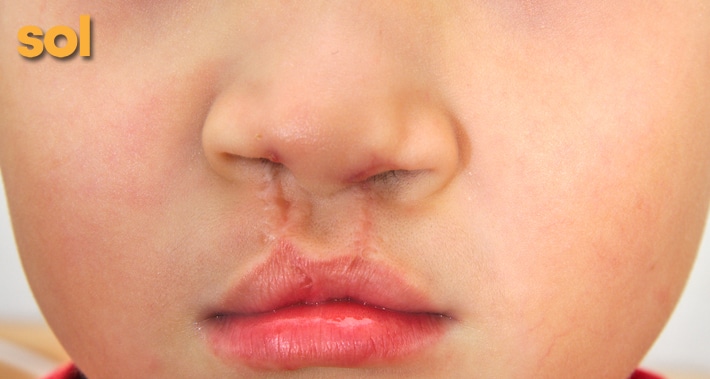
One of a first things a new parent does is “count fingers and toes” on their new bundle of joy.
However, if your baby has cleft palate, you may be wondering how it will interfere with your child’s quality of life.
Fortunately, there is help.
Speech therapy for kids can help provide solutions for the speech and language difficulties associated with cleft palate.
Keep reading to learn more about cleft palate and how speech therapy can play a role.
What Is Cleft Palate?
Cleft palate is a craniofacial condition that is present at birth and causes facial anomalies.
It is a result of atypical embryotic growth between the fourth and tenth weeks of development.
Cleft palate can be classified depending on the structures involved, laterality, and severity.
For instance, overt palatal cleft produces a cleft that is visibly open.
On the other hand, submucous cleft palate produces a hidden cleft, and is caused by underlying velar musculature failing to attach to the midline.
Cleft palate may be associated with many craniofacial and genetic sequences or syndromes, such as Stickler syndrome or Pierre Robin sequence.
Symptoms Of Cleft Palate
The symptoms of cleft palate vary, depending on the type and severity of the cleft, and whether both lip and palate are involved.
In general, babies and children with cleft palate often experience numerous speech and language, dental, hearing, and social difficulties.
If your baby has a cleft palate, you may notice the following speech and language characteristics:
- Delayed, and less variety of baby babbling
- Fewer consonant productions, due to inability to push air through mouth
- Delayed onset of first words and acquiring words more slowly
- Preference for words beginning with sonorants (nasal sounds and vowels)
As your child gets older, you may notice the following speech and language characteristics:
- A limited number of speech sounds
- Substituting or omitting certain sounds
- Articulation issues
- Delayed expressive language development
In these cases, speech therapy for articulation disorders can help.
If your child has cleft palate, they may also have some issues with their teeth, including:
- Missing teeth
- Malrotated teeth
- Teeth that are abnormally located
- Excess or duplicated teeth
- Overbite
- Underbite
- Open bite (teeth don’t fully close)
- Lateral crossbite
If your child has cleft palate, they may experience some social difficulties, including:
- Poor self concept and self confidence
- Depression and anxiety
- Difficulty maintaining friendships
- Teasing, bulling, and discrimination based on appearance
What Causes Cleft Palate?
There isn’t a single cause of cleft palate.
Instead, cleft palate is thought to be caused by a variety of factors, including:
- Family history of cleft palate
- Race (cleft palate is more common in individuals of Asian or Native American descent)
- Sex (males are more likely to have cleft lip with or without cleft palate, whereas females are more likely to have cleft palate without cleft lip
- Exposure to certain environmental substances, including alcohol, prescriptive and illegal drugs
How Can Cleft Palate Interfere With Speech?
Cleft palate can have drastic effects on your child’s speech production.
To produce most sounds, your child’s soft palate must move to close the space between their mouth and nose.
With cleft palate, their soft palate is unable to do this.
This is called velopharyngeal insufficiency.
With velopharyngeal insufficiency, air and sound escape through your child’s nose when they talk, which can interfere with their speech.
In particular, it can interfere with your child’s resonance and airflow, articulation, nasal emission, and voice.
These may include:
- Hypernasality, especially with vowel sounds
- Air being released from nasal cavity at inappropriate times
- Rough or harsh vocal quality, due to air production that is difficult to control
- Soft voice syndrome, due to loss of pressure or reducing vocal intensity to disguise other symptoms
How Can Cleft Palate Interfere With Feeding?
Feeding difficulties are often the first problem following the birth of a child with cleft palate.
If your baby has a cleft lip without cleft palate, they are not likely to experience major feeding issues.
However, if your child has a cleft palate, they may have trouble breast or bottle feeding, and may need a special bottle or nipple.
Babies with cleft palate are incapable of separating the nasal cavity from the oral cavity, making it impossible to create the pressure necessary for sucking.
If your baby is struggling to feed due to cleft palate, you may notice the following associated problems:
- Fatigue due to excess energy spent trying to feed
- Poor weight gain
- Excessive air intake
- Nasal regurgitation
In babies with comorbid conditions, such as other craniofacial anomalies or premature babies, these problems can become more life threatening.

How A Speech Therapist Can Help Treat A Cleft Palate
Cleft palate is usually treated with surgery.
However, there may still be post surgical complications for your child’s voice.
Your child’s speech therapist will focus on helping your child develop their speech by helping them create speech sounds, expand their vocabulary, and improve oral airflow.
Before surgery, a speech therapist will help your child:
- Use voice play activities to stimulate production of speech sounds least effected by the cleft
- Encourage alternatives for compensatory productions (saying “no no” instead of “uh uh”)
After surgery, a speech therapist will help your child:
- Increase variety of vocalization through sound play
- Increase consonant inventories
- Increase communication opportunities
- Increase vocabulary
- Increase awareness of oral airflow for speech
- Monitor persistent nasal substitutions and glottal stops
Like many pediatric speech disorders, speech therapy early intervention is key to help bring your child the best results.
Book An Appointment With Sol Speech And Language Today
If your child has cleft palate, early speech and language intervention is essential.
At Sol Speech And Language Therapy, our licensed speech therapists are passionate about helping your child reach their fullest potential.
Book your appointment today.
6448 E Hwy 290 Suite E-108,
Austin, TX 78723
(512) 368-9488
» https://g.page/r/CfRfhOpEQm7BEAE
Sol Speech & Language Therapy
555 Round Rock W Dr E-221,
Round Rock, TX 78681
(512) 808-3953
» https://g.page/r/Cb5pwCTosSEfEBM
Sol Speech & Language Therapy offers personalized skilled intervention to those struggling with their speech and language skills. Services offered include screening, consultation, and comprehensive evaluation. We also provide one-on-one and/or group therapy for speech sound disorders, receptive/expressive language delay/disorder, stuttering/cluttering, accent reduction, and much more.